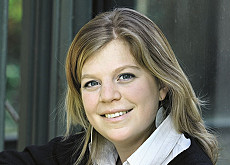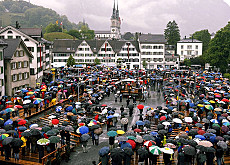Political maturity “not a question of age”

Nadine Masshardt, a 22-year-old Bern cantonal parliamentarian, tells swissinfo why she believes the voting age in Switzerland should be lowered to 16.
Glarus recently became the first canton to change its voting age for local matters from 18 to 16, a decision which has caused a storm of debate in the rest of the country. Canton Bern is due to vote on the matter next year.
Masshardt, a keen supporter of the Bern motion, believes a lower voting age, e-voting and more emphasis on politics at schools will motivate young people to take part in ballots.
The youngest parliamentarian in canton Bern represents the centre-left Social Democratic Party.
swissinfo: What do you hope to gain by reducing the voting age to 16?
Nadine Masshardt: First of all, to give a positive signal to young people, no matter whether they take advantage of these opportunities or not. It would give them the feeling of being taken seriously. They would know that those who want to, can go and vote.
This, combined with more politics lessons at school, would make young people feel more motivated to get involved in politics.
swissinfo: Why do so many young people nevertheless believe that they are not politically mature enough at this age?
N.M.: I don’t think political maturity is a question of age. The low voter turnout, especially on cantonal matters, shows that even older people are not always very politically mature. Otherwise they would vote more often.
swissinfo: You are also calling for more politics lessons in schools. How can you interest people of your age?
N.M.: It’s not just about having more, but also about having better politics lessons. If pupils are better informed, then it makes more sense to lower the voting age.
You can only interest young people if you show them how directly they are affected by politics, as even at their young age much depends on politics. How many weekend night buses there are, how long the holidays are for apprentices… these are already the first political decisions.
The voting age of 16 should not only expose young people to how politics and voting works, but also to the real themes around it.
swissinfo: Should one also use methods of communication that appeal to young people, like e-voting?
N.M.: Of course, I’d welcome the use of e-voting. Any measure that helps improve voter turnout is good, especially as older people are not exactly role models here.
E-voting could make communication easier, but not the procedure. This is in part very complicated for the House of Representatives and e-voting won’t make it any easier.
Voter turnout can be improved through more dialogue and showing how people are directly affected. An ideal combination would be: better lessons, a lower voting age and new forms of communication.
swissinfo: How did you become interested in politics so early?
N.M.: My interest came about gradually and also through conversations with my peers who had totally different political opinions. That spurred me on. I wasn’t brought up with politics either, as my family is not involved in it.
I only joined a party after I had finished my matura [baccalaureate]. It isn’t so much the party work but the small things, such as lobbying for more bike parking spaces, which make politics for me. This always shows me how much of a difference you can make when you are politically active. I have also always, even as a child, had a keen sense of justice. I was always ready to help, support and get involved.
swissinfo: You also maintain that solidarity between the generations will improve by lowering the voting age. How come?
N.M.: The Swiss population is getting older and the number of young people smaller. And older people are tending to tip the balance in political decisions, even though it’s the young people who will have to bear the consequences. Their salary contributions will go towards filling up the disability and health insurance funds in the future.
The younger generation’s commitment to provide for the older generation affects the old age pension system. Dialogue is therefore important and it would only be fair if thanks to the voting age of 16 more young people could get involved.
swissinfo: Would you approve of the voting age of 16 being extended to a national level as well?
N.M.: Of course we should ask for it on a national level. Young people and their futures are directly affected by such topics as climate change, new forms of poverty, not having many job prospects – and this goes far beyond the local and cantonal levels.
swissinfo-interview: Alexander Künzle
Nadine Masshardt was born in 1984 and grew up in Langenthal.
She did her matura (baccalaureate) in 2003 and is now studying philosophy and history at Fribourg University.
A member of the Social Democrats since 2003 and was voted into Langenthal city parliament in 2004.
She was elected to the Bern cantonal parliament in 2006 and is candidate for the House of Representatives in 2007.
Hobbies: all types of dance, culture, literature and theatre.
The young Swiss confederation of 1848 set the age to vote on federal matters at 20.
The Swiss electorate voted to lower this to 18 in 1991, after such a proposal had been turned down in 1979.
The first canton to grant the right to vote at 18 was Schwyz in 1898. Other cantons did not follow the lead until 1977.
Young left-wing political activists have been calling for the right to vote from 16 for some time.
Canton Bern may be the next to follow the example of Glarus. Cantons Graubünden and Zurich have already rejected such a move.
Glarus is the first Swiss canton to introduce the right to vote on cantonal and communal issues at 16.
In the European Union, the two German states of Lower Saxony and Schleswig-Holstein already grant the right to vote from 16.
The Austrian government wants to do the same at national level, with parliament due to have its say in the near future.

In compliance with the JTI standards
More: SWI swissinfo.ch certified by the Journalism Trust Initiative


You can find an overview of ongoing debates with our journalists here . Please join us!
If you want to start a conversation about a topic raised in this article or want to report factual errors, email us at english@swissinfo.ch.